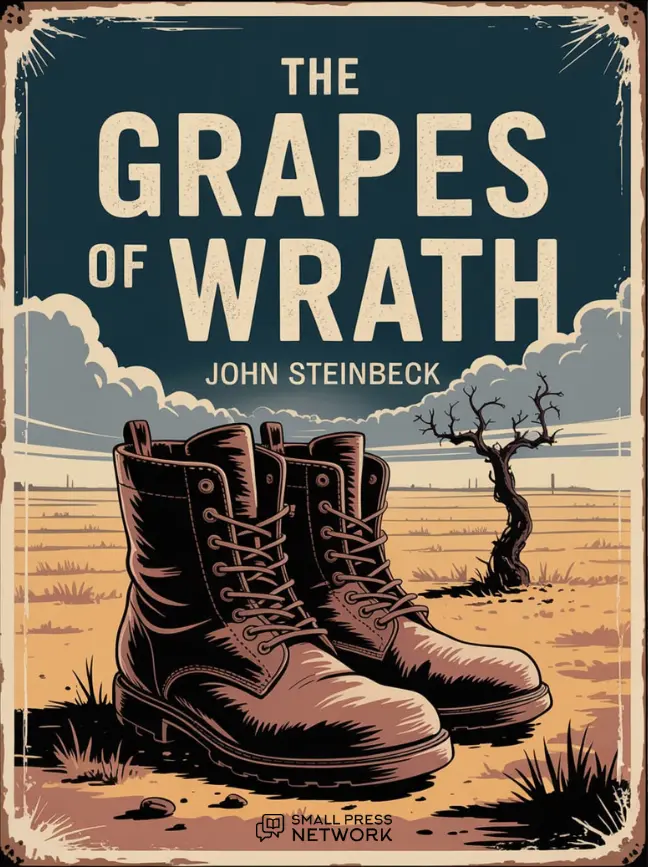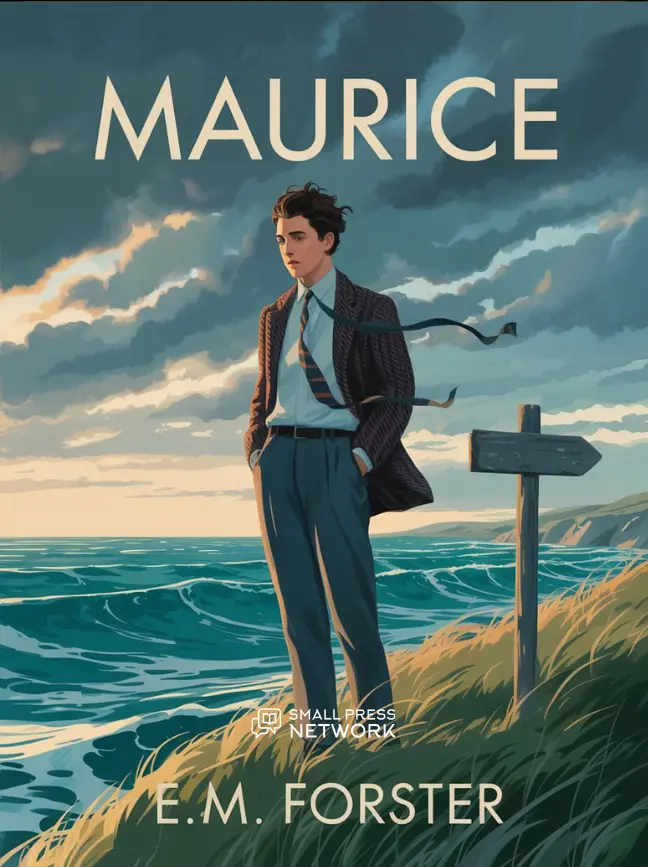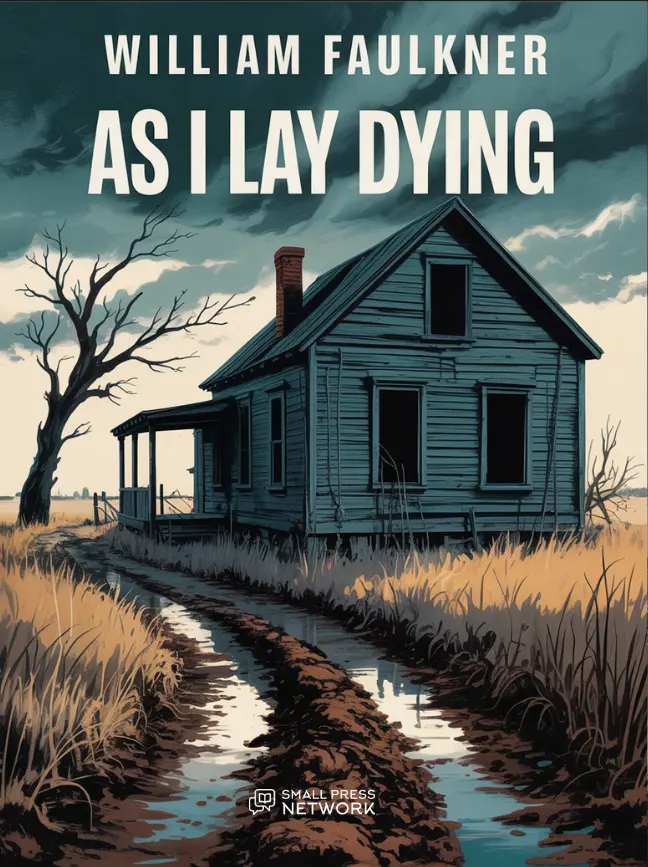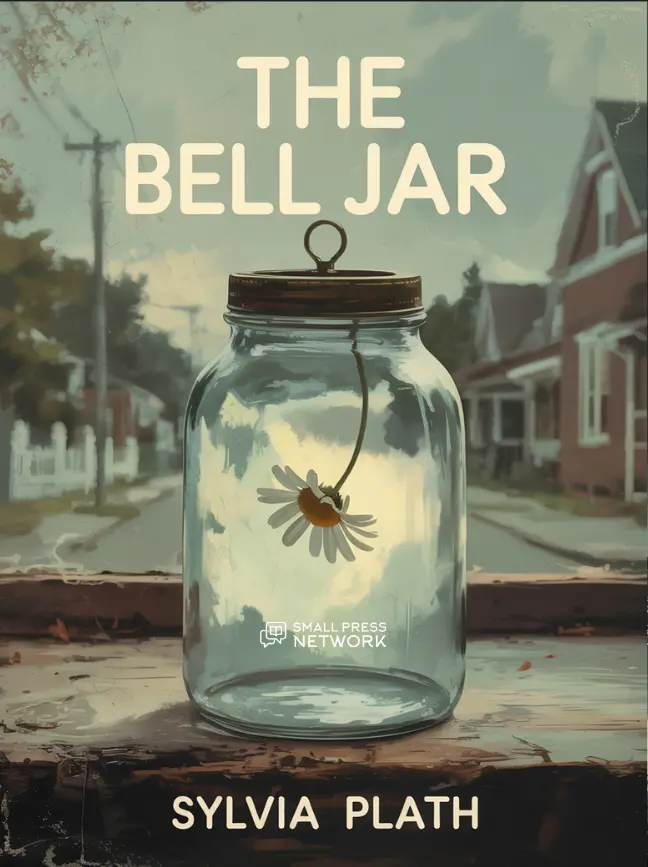Chapter Nine
In the little houses the tenant people sifted their belongings and the belongings of their fathers and of their grandfathers. Picked over their possessions for the journey to the west. The men were ruthless because the past had been spoiled, but the women knew how the past would cry to them in the coming days. The men went into the barns and the sheds.
That plow, that harrow, remember in the war we planted mustard? Remember a fella wanted us to put in that rubber bush they call guayule? Get rich, he said. Bring out those tools—get a few dollars for them. Eighteen dollars for that plow, plus freight—Sears Roebuck.
Harness, carts, seeders, little bundles of hoes. Bring ’em out. Pile ’em up. Load ’em in the wagon. Take ’em to town. Sell ’em for what you can get. Sell the team and the wagon, too. No more use for anything.
Fifty cents isn’t enough to get for a good plow. That seeder cost thirty-eight dollars.
Two dollars isn’t enough. Can’t haul it all back— Well, take it, and a bitterness with it.
Take the well pump and the harness. Take halters, collars, hames, and tugs. Take the little glass brow-band jewels, roses red under glass. Got those for the bay gelding. ’Member
how he lifted his feet when he trotted?
Junk piled up in a yard.
Can’t sell a hand plow any more. Fifty cents for the weight of the metal. Disks and tractors, that’s the stuff now.
Well, take it—all junk—and give me five dollars. You’re not buying only junk, you’re buying junked lives. And more—you’ll see—you’re buying bitterness. Buying a plow to plow your own children under, buying the arms and spirits that might have saved you. Five dollars, not four. I can’t haul ’em back— Well, take ’em for four. But I warn you, you’re buying what will plow your own children under. And you won’t see. You can’t see. Take ’em for four. Now, what’ll you give for the team and wagon? Those fine bays, matched they are, matched in color, matched the way they walk, stride to stride. In the stiff pull—straining hams and buttocks, split-second timed together. And in the morning, the light on them, bay light. They look over the fence sniffing for us, and the stiff ears swivel to hear us, and the black forelocks! I’ve got a girl. She likes to braid the manes and forelocks, puts little red bows on them. Likes to do it. Not any more. I could tell you a funny story about that girl and that off bay. Would make you laugh. Off horse is eight, near is ten, but might of been twin colts the way they work together. See? The teeth. Sound all over. Deep lungs. Feet fair and clean. How much? Ten dollars? For both?
And the wagon— Oh, Jesus Christ! I’d shoot ’em for dog feed first. Oh, take ’em! Take ’em quick, mister. You’re buying a little girl plaiting the forelocks, taking off her hair
ribbon to make bows, standing back, head cocked, rubbing the soft noses with her cheek.
You’re buying years of work, toil in the sun; you’re buying a sorrow that can’t talk. But watch it, mister. There’s a premium goes with this pile of junk and the bay horses—so beautiful—a packet of bitterness to grow in your house and to flower, some day. We could have saved you, but you cut us down, and soon you will be cut down and there’ll be none of us to save you.
And the tenant men came walking back, hands in their pockets, hats pulled down.
Some bought a pint and drank it fast to make the impact hard and stunning. But they didn’t laugh and they didn’t dance. They didn’t sing or pick the guitars. They walked back to the farms, hands in pockets and heads down, shoes kicking the red dust up.
Maybe we can start again, in the new rich land—in California, where the fruit grows.
We’ll start over.
But you can’t start. Only a baby can start. You and me—why, we’re all that’s been.
The anger of a moment, the thousand pictures, that’s us. This land, this red land, is us; and the flood years and the dust years and the drought years are us. We can’t start again.
The bitterness we sold to the junk man—he got it all right, but we have it still. And when the owner men told us to go, that’s us; and when the tractor hit the house, that’s us until we’re dead. To California or any place—every one a drum major leading a parade of hurts, marching with our bitterness. And some day—the armies of bitterness will all be going the same way. And they’ll all walk together, and there’ll be a dead terror from it.
The tenant men scuffed home to the farms through the red dust.
When everything that could be sold was sold, stoves and bedsteads, chairs and tables, little corner cupboards, tubs and tanks, still there were piles of possessions; and the women sat among them, turning them over and looking off beyond and back, pictures, square glasses, and here’s a vase.
Now you know well what we can take and what we can’t take. We’ll be camping out —a few pots to cook and wash in, and mattresses and comforts, lantern and buckets, and a piece of canvas. Use that for a tent. This kerosene can. Know what that is? That’s the stove. And clothes—take all the clothes. And—the rifle? Wouldn’t go out naked of a rifle. When shoes and clothes and food, when even hope is gone, we’ll have the rifle.
When grampa came—did I tell you?—he had pepper and salt and a rifle. Nothing else.
That goes. And a bottle for water. That just about fills us. Right up the sides of the trailer, and the kids can set in the trailer, and granma on a mattress. Tools, a shovel and saw and wrench and pliers. An ax, too. We had that ax forty years. Look how she’s wore down.
And ropes, of course. The rest? Leave it—or burn it up.
And the children came.
If Mary takes that doll, that dirty rag doll, I got to take my Injun bow. I got to. An’ this roun’ stick—big as me. I might need this stick. I had this stick so long—a month, or maybe a year. I got to take it. And what’s it like in California?
The women sat among the doomed things, turning them over and looking past them and back. This book. My father had it. He liked a book. Pilgrim’s Progress. Used to read it. Got his name in it. And his pipe—still smells rank. And this picture—an angel. I looked at that before the fust three come—didn’t seem to do much good. Think we could
get this china dog in? Aunt Sadie brought it from the St. Louis Fair. See? Wrote right on it. No, I guess not. Here’s a letter my brother wrote the day before he died. Here’s an old- time hat. These feathers—never got to use them. No, there isn’t room.
How can we live without our lives? How will we know it’s us without our past? No.
Leave it. Burn it.
They sat and looked at it and burned it into their memories. How’ll it be not to know what land’s outside the door? How if you wake up in the night and know—and know the willow tree’s not there? Can you live without the willow tree? Well, no, you can’t. The willow tree is you. The pain on that mattress there—that dreadful pain—that’s you.
And the children—if Sam takes his Injun bow an’ his long roun’ stick, I get to take two things. I choose the fluffy pilla. That’s mine.
Suddenly they were nervous. Got to get out quick now. Can’t wait. We can’t wait.
And they piled up the goods in the yards and set fire to them. They stood and watched them burning, and then frantically they loaded up the cars and drove away, drove in the dust. The dust hung in the air for a long time after the loaded cars had passed.




